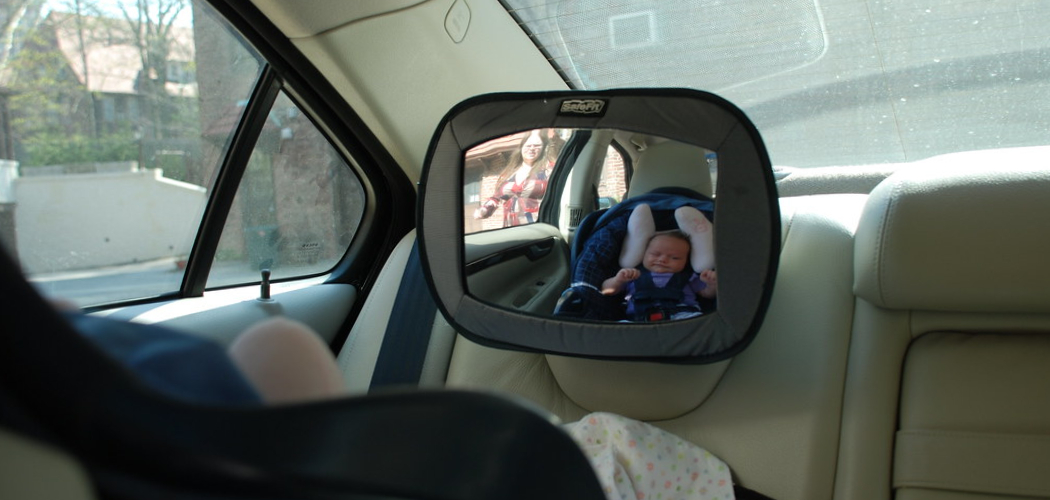Determining whether your electric vehicle’s mirrors are malfunctioning is critical for maintaining optimal visibility and safety while on the road. These convenient components allow drivers to swiftly adjust their view, accommodating individuals of varying heights and assisting in eliminating blind spots. However, electric mirrors can sometimes encounter issues.
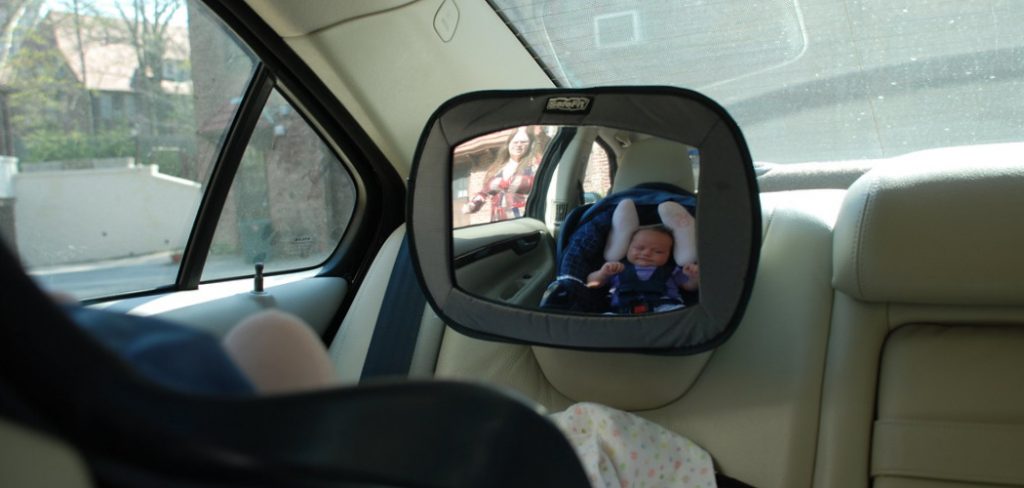
If you’re facing a situation where your electric mirrors seem unresponsive, don’t worry—identifying and resolving the problem might be more straightforward than anticipated. Here are the signs that may indicate how to tell if the electric mirror is not work properly.
The Importance of Functioning Car Mirrors
Before delving into the troubleshooting process, it’s crucial to underscore the significance of car mirrors for road safety. Mirrors play a critical role in providing you with a clear, unobstructed view of your surroundings, essential for making safe lane changes, reversing, and keeping an eye on traffic conditions.
An electric mirror that is stuck or unadjustable could potentially lead to an avoidable accident, making a quick resolution all the more imperative.
Understanding Electric Car Mirrors
Electric car mirrors are a great advance over traditional manual mirrors. They consist of a mirror housing, glass, an electric motor, a control switch, and wires connecting it all to your car’s electrical system. When you press the adjustment switch, electricity flows through the wires to the motor, which moves the mirror within its housing.
Electric mirrors come in two types: those that can be adjusted directly in the car and more high-tech versions with memory settings that remember the mirror position for different drivers and can include heating elements to defrost or de-ice the mirror.
Common Issues with Electric Car Mirrors
Like any other electronic component, electric mirrors can develop a range of problems that render them inoperable. Here are a few common culprits:
Broken Wiring
The wires that power the mirror can wear out over time or become damaged, preventing power from reaching the motor.
Faulty Switch
The control switch that commands the mirror to adjust may be damaged or worn out from regular use.
Blown Fuse
Like any other electric component, electric mirrors are protected by a fuse. An electric surge from a short circuit can blow the fuse, stopping the mirror from working.
Motor Failure
The mirror’s electric motor itself can fail. Sometimes, this can be due to a worn-out motor or problems within the mirror’s assembly.
How to Tell if The Electric Mirror Is Not Work: A DIY Guide
Electric car mirrors are a modern convenience we rarely appreciate until they stop working. If you’re a DIYer and find yourself squinting to see that lane change you’re about to make, it’s time to inspect your electric mirrors. Don’t fret; with a little guidance and a smidge of elbow grease, you can save yourself a trip to the mechanic. Here’s how to sleuth out what’s causing your mirror malfunctions.
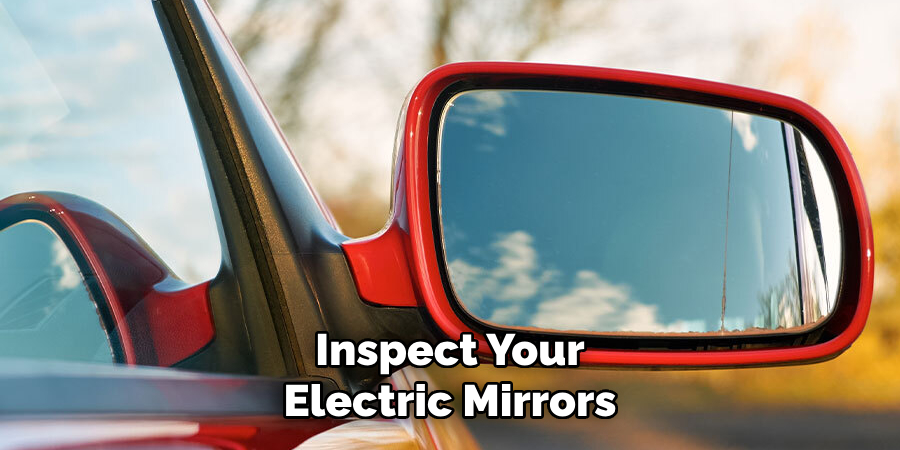
1. Conduct a Control Switch Check
The first order of business is to see if the problem is as simplistic as a faulty control switch. Here’s a quick troubleshooting process:
- Sit in your car and try to adjust the mirror using the control switch.
- If there is no movement, the switch might be defective.
2. Test the Fuse
Fuses are the first line of defense against electrical overload. If a fuse is blown, your mirror won’t move. To check this, follow these steps:
- Locate the fuse box, usually under the dashboard or in the engine compartment.
- Using a fuse puller, remove the appropriate fuse and inspect it for a break in the metal wire.
3. Inspect the Mirror Motor
When neither the switch nor the fuse are the culprits, it’s time to consider the mirror motor. This is a little more involved but still feasible for the DIYer.
- Remove the mirror housing by gently prying it away from the door frame.
- Disconnect the motor wiring and check the resistance across the motor terminals. If it’s not within the manufacturer’s specifications, it’s likely fried.
- Inspect the motor for damage signs, such as burnt or corroded terminals.
4. When All Else Fails, Seek Professional Help
Sometimes, the issue might be more complex, possibly involving a short circuit or a problem within the mirror housing that a professional best handles. If you’ve come this far and are still staring at dead mirrors, it’s time to take the issue to a certified technician.
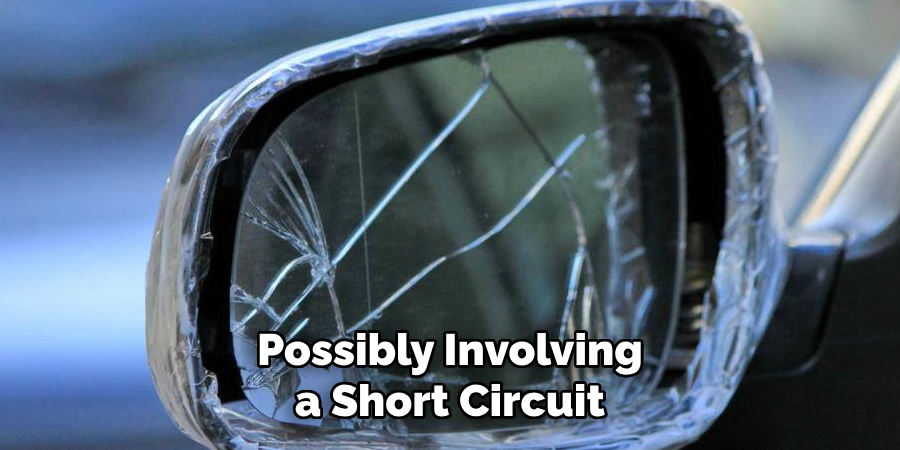
Troubleshooting Steps
If your electric mirror isn’t working as it should, here are the steps to diagnose and potentially fix the problem:
Checking the Fuse
The first thing to check is the fuse. Your vehicle’s manual can tell you where the mirror fuse is located. Use a multimeter to test if the fuse is blown. If it is, replace it. Remember, a blown fuse is a symptom of a problem, not the problem itself, so be vigilant for other issues.
Testing the Switch
If the fuse is fine, the next step is to test the switch. You’ll need to disassemble the door panel to gain access to the switch. Once you’ve reached the switch, turn the key to the “on” position and test for power using a multimeter. If there’s power but the switch still isn’t working, you might need to replace it.
Inspecting the Wiring
If the fuse and switch check out, the next likely culprit could be the wiring. Use the multimeter to check for power at various points along the wire leading to the mirror motor. Look for any damage or wear in the wire insulation that could cause a short or disconnect.
Assessing the Motor
Lastly, if you’ve confirmed that the fuse, switch, and wiring are all in good shape, the problem likely lies with the motor itself. You can test the mirror motor by directly applying power to it and observing if it moves. If it doesn’t, you’ll likely need to replace the motor or the entire mirror assembly.
Preventive Maintenance Tips
While it might be too late for the current issue, there are a few things you can do to lessen the chances of electric mirror problems in the future:
Cleaning and Lubricating the Mirrors
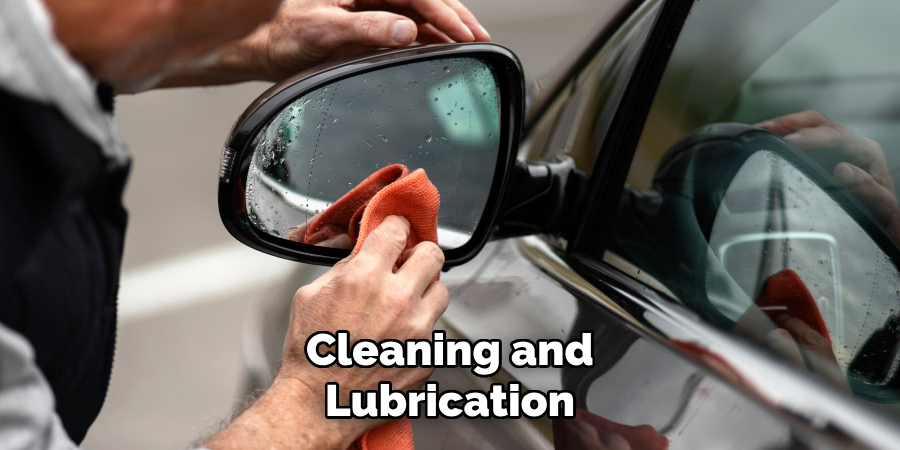
The mirror’s motor and gearing can benefit from occasional cleaning and lubrication. Dust and moisture can build up over time and cause the motor to work harder than normal, leading to eventual failure.
Regularly Checking for Loose Connections
Periodic inspection of the wires and connections can alert you to an issue before it becomes a full-blown problem. Tighten any loose connections and address any exposed or damaged wiring as soon as possible.
5 Common Mistakes People Make When Trying to Identify if The Electric Mirror Is Not Work
Electric car mirrors are a vital safety feature, and when they stop working, it can be frustrating. However, attempting to diagnose the issue yourself can lead to costly mistakes. Here are five common mistakes people make when trying to identify if their electric mirror is not working:
1. Ignoring the Manual
Most vehicles come with a manual that includes essential information about your car’s components and how to troubleshoot issues. Ignoring the manual can lead to missed steps or further damage.
2. Not Conducting a Proper Diagnosis
Jumping straight into replacing parts without proper diagnosis can waste time and money and create new problems if the original issue is misdiagnosed.
3. Overlooking Simple Solutions
Sometimes, the problem is as simple as a blown fuse or a loose wire. Don’t overlook these potential culprits to find a more complex issue.
4. Using Incorrect Tools or Techniques
DIY repair requires the right tools and techniques, especially for electrical components that can be easily damaged. Always use proper equipment and follow recommended procedures.
5. Not Seeking Professional Help When Needed
If you’re unsure about the issue or don’t have the necessary skills and tools, it’s best to seek professional help rather than attempting a repair yourself. This can save you time, money, and potential safety hazards.
Frequently Asked Questions (FAQs) About Electric Mirror Troubleshooting
1. Is Performing Electric Mirror Troubleshooting and Repairs at Home Safe?
Yes, many aspects of electric mirror troubleshooting, such as checking fuses, switches, and connections, can be safely performed at home by following proper guidance. However, safety should be your top priority. Always ensure your vehicle’s ignition is off when working on electrical parts, and if you are not confident or well-versed in automotive repairs, it’s best to seek assistance from a professional.
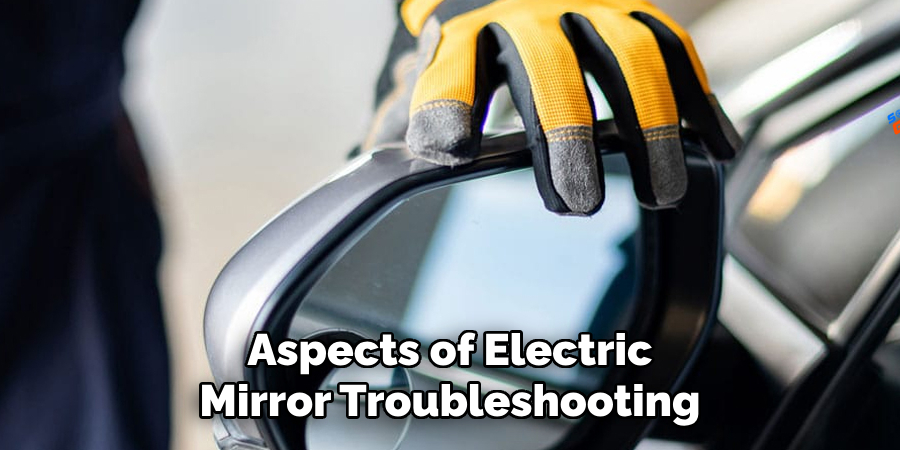
2. How do I Know if My Mirror’s Motor Needs to Be Replaced or If It’s an Electrical Issue?
If the motor doesn’t respond when directly provided with power, it strongly indicates that the motor needs replacement. However, if there is no power reaching the motor, it may indicate an electrical issue, such as a blown fuse, a faulty switch, or damaged wiring. Using a multimeter to test for the presence of power at various points can help distinguish between the two.
3. Are There Any Particular Signs that Can Indicate that My Electric Mirror System May Soon Fail?
Look for mirrors that move more slowly than usual, make strange noises during adjustment, or start to function intermittently. These signs can precede a failure and are often due to dirty, corroded, or worn-out components. Regular maintenance and cleaning can help prevent such issues and extend the longevity of your electric mirror system.
Conclusion
Electric mirrors are a wonderful convenience that can greatly enhance your driving experience. However, when they stop working, it can be frustrating and, more importantly, a potential safety issue.
By following the steps above, you can troubleshoot and fix the issue with your car’s electric mirrors and ensure that your vehicle remains a safe and reliable mode of transportation. Remember, proper maintenance and quick troubleshooting can save you time and money, all while keeping you safe. Thanks for reading our post about how to tell if the electric mirror is not work.

